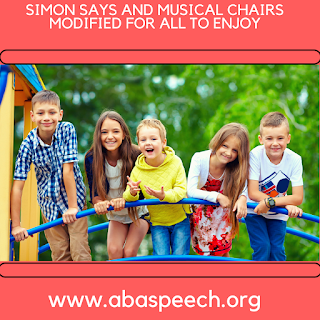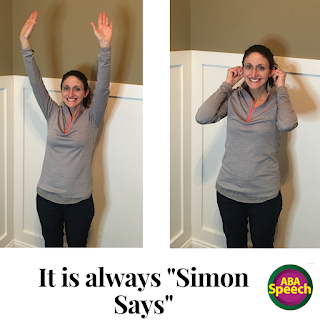Play is so very important for all children! I have three small children of my own and they love to play. We play games, babies, sports, gymnastics, kitchen, etc… It is never ending. What I have learned in my many years of being both a speech language pathologist and board certified behavior analyst is that students with disabilities may benefit from modifications to enjoy independent and cooperative play activities. This blog post will detail the way that I modify 2 very popular games for younger students- Simon Says and Musical Chairs.
I have many students who benefit from structured small group speech therapy sessions. At the end of each session, I focus on a modified leisure skill. There are so many benefits to working directly on modified leisure skills.
- If you share with the teacher and/or classroom staff
how to play the modified game, they can give the student opportunities to practice within the classroom environment
- If you share with the parent via a written description
or video of how to play the game, they can carry it over into the home
environment
- The students will increase their cooperative leisure
skill repertoire
- Direct work on leisure skills allows for practice of a
variety of functional life skills to include but not limited to: taking a turn, waiting for a turn, following directions, engaging in a play based task for a duration of time without leaving the activity, communicating with peers during a play based task, requesting during the task.
It is beneficial if you have a helper or two present for your group lesson, especially if you are teaching a new play based or leisure based skill. This help will make it easier to teach the skill, so that the helpers can prompt the students as needed throughout the activity. It is also helpful for showing other team members how to work on the play skills, so that they can generalize these skills into the classroom environment. I try to introduce and work on a new modified leisure skill for 1-2 months, depending on how fast the students learn the skill and if they enjoy the play activity. I will describe the modifications I use below.
Modified Musical Chairs
· I set up the chairs in a circle. I use the same amount of chairs, as students that I have playing the game. I tell the students the directions “ When you hear the music walk around the chairs, when the music stops sit down.”The modification is that you never take away a chair. I use songs my students really enjoy or songs that are current.
· We play for 5-10 minutes. Helpers prompt students as needed with following the directions.
Simon Says
My students just finished up learning this game and they continue to request it often! I have all of the students stand in a circle by me, so that they can see me throughout the game. I tell them to watch me and do what I do. I then give directions and each time I start with “Simon says.” I include directions that all students can do in the space that we have provided in my office (i.e. jump, march, twist, shout hooray). I also play this game for the same amount of time, about 5-10 minutes. I also let some of the students call out a direction for the group- they love this!!
Working on leisure skills can be fun for student and professional alike. Direction instruction on these skills helps students increase their leisure skill repertoires. Engaging in these activities with the above modifications allows our students to feel successful and happy! If you want to learn more about these games and others, check out my webinar about modified leisure skills and elementary aged students
here. 


0 Comments